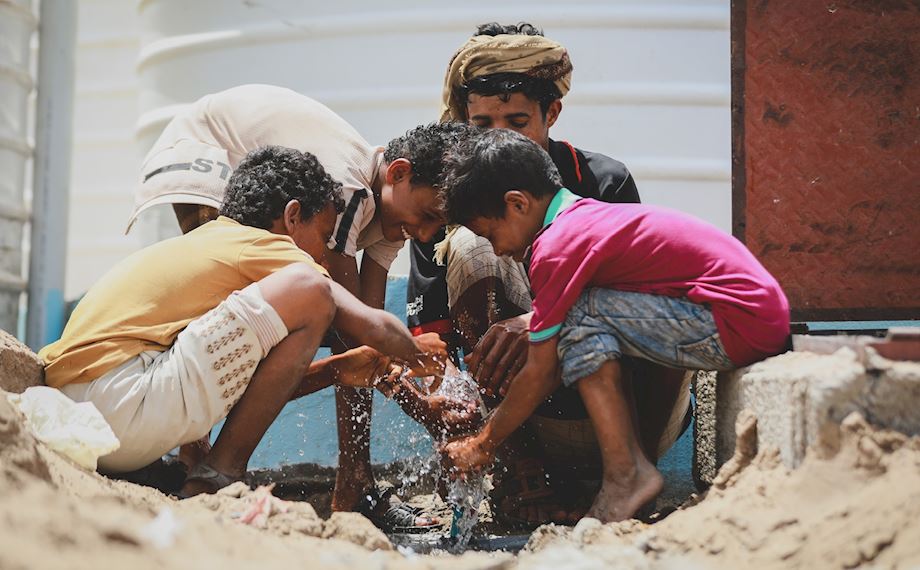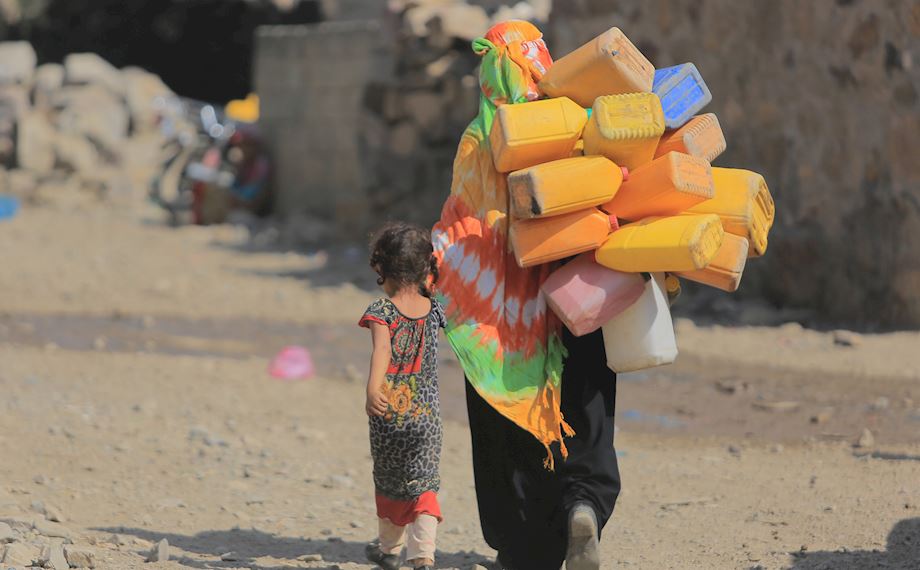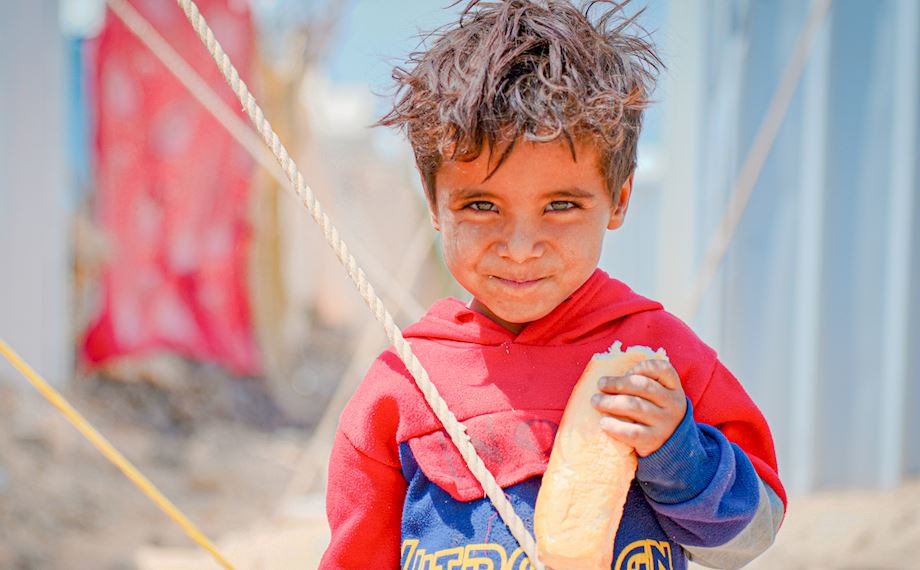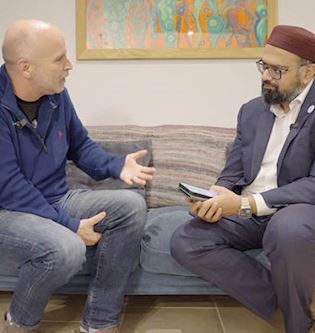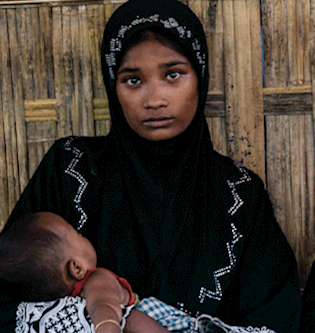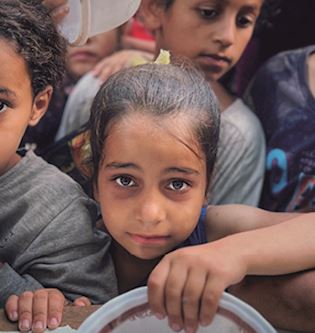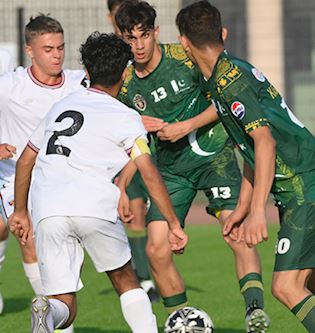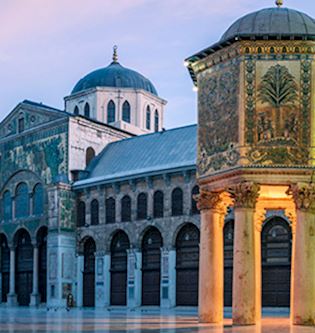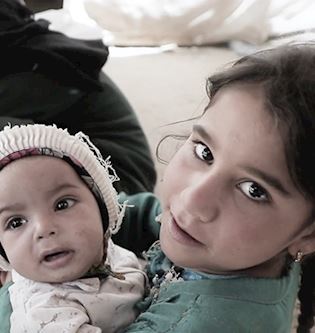Explained: Rehabilitating Water Infrastructure in Ma'rib

Even before the ongoing conflict, Yemen was a water-scarce region. Six years of civil war has severely impacted the country’s water infrastructure, leaving 20.5 million people in urgent need of WASH assistance [UN]. With your support, our team have been rehabilitating wells in rural Yemen, converting them to solar-powered wells to supply clean drinking water to vulnerable and displaced families round-the-clock.
Because of your generosity, we are now scaling up these projects to benefit even more people. In Ramadan 2021, we began fundraising for a massive project in Aden, rehabilitating its infrastructure to provide water for LIFE to 1.7 million people. Ma sha Allah, you gave over £445,000 to this project and our Yemen team is implementing it right now!
We are now planning a similar project in Ma'rib, which is suffering from a water crisis due to outdated and damaged infrastructure as well as an overwhelming influx of IDPs.
This article will explain the current situation in Ma'rib, how its existing infrastructure works, the problems with this infrastructure, the impact of water shortages on families, our solutions to the water crisis and, finally, how your support can change the lives of almost 1.3 million people.
What is the current situation in Ma'rib?
Ma'rib is the capital city of the Ma'rib Governorate in Yemen. It is located approximately 120 kilometres east of Sana'a, the country's capital.
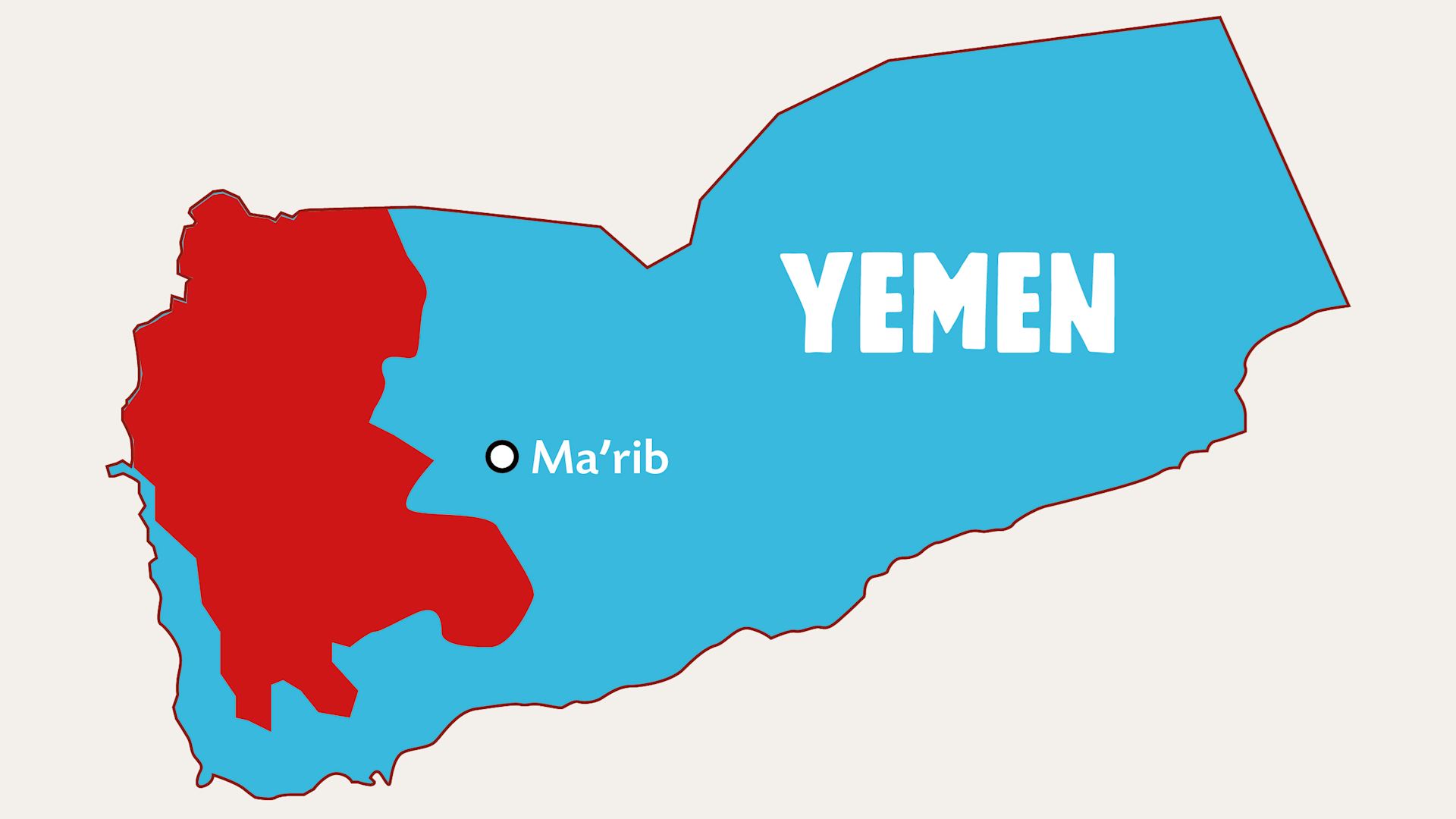
Ma'rib is actually a historically significant city, as it was the capital of the Sabaean Kingdom. (This kingdom is known as Saba or Sheba - you may know that it was ruled by Bilqis, the Queen of Saba, during the time of Sulaiman (as)). The Sabaeans were known for building the Great Dam of Ma'rib, whose ruins still exist today. We will definitely be covering the history and religious significance of Ma'rib in a separate article, in sha Allah!
We've mentioned the Great Dam of Ma'rib to illustrate that the city was historically known for its water infrastructure. The dam was an engineering marvel and fed a complex irrigation system that could cover up to 25,000 acres of farmland. It served the local population for an entire millennium before it was breached and subsequently fell into ruin. Later, the modern Ma'rib Dam was built close by (in 1984).
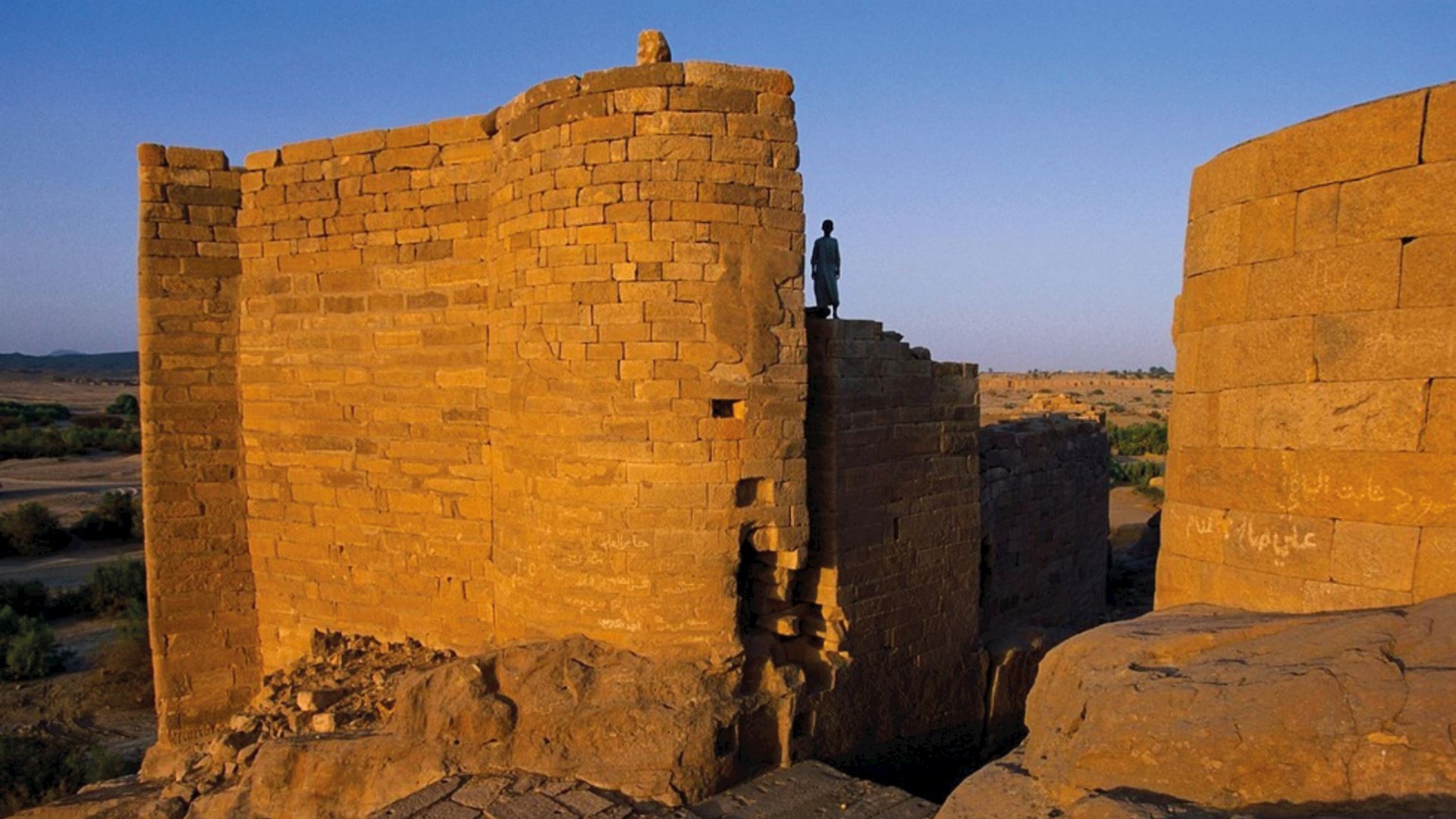
So how did a city known for its water engineering become known for its water crisis?
There are several problems with Ma'rib's infrastructure, which we will discuss later, but the main issue is that it is unable to accommodate the sheer number of people who have settled in Ma'rib in recent years.
In 2014, the city was home to only 40,000 people, according to local authorities. Meanwhile, the overall Ma'rib Governorate had a population of 300,000 in total at the beginning of the conflict (in 2015).
There are now 1.5 million people living in the Ma'rib Governorate.
They have settled in the rural areas of the Governorate as well as in the city itself, fleeing from conflict in other parts of Yemen. Some are living in makeshift shelters; some have sought refuge within Ma'rib's communities. In 2020, it was reported that 70% of these IDPs were in need of shelter support [Relief Web] - as well as food, clean water and health care.
Therefore - although Ma'rib was blessed with rich natural resources, fertile agricultural land and a history of marvellous water engineering - its population are now lacking basic human rights. Its infrastructure is simply unable to cope with the overwhelming number of families who have been displaced to this city.

The Governorate's population is constantly increasing and shifting. Every level of the water infrastructure is unable to meet the growing need - water sources, distribution tanks, even the diameter of pumping lines - as we will explain later.
How does the existing water infrastructure work?
Here’s a simple, step-by-step look at how Ma'rib's water network works:
- Ma'rib depends on underground wells as the only source of water.
- There are currently eight operating wells in Ma'rib (we'll discuss these wells in more detail when we explain the infrastructure problems in Ma'rib).
- Water is transported from these wells via pumping lines to various distribution networks.
- Distribution networks include small tanks, from which water is piped directly into people's homes.
- These small tanks also store water reserves, in case there is a problem with a well or pumping line.
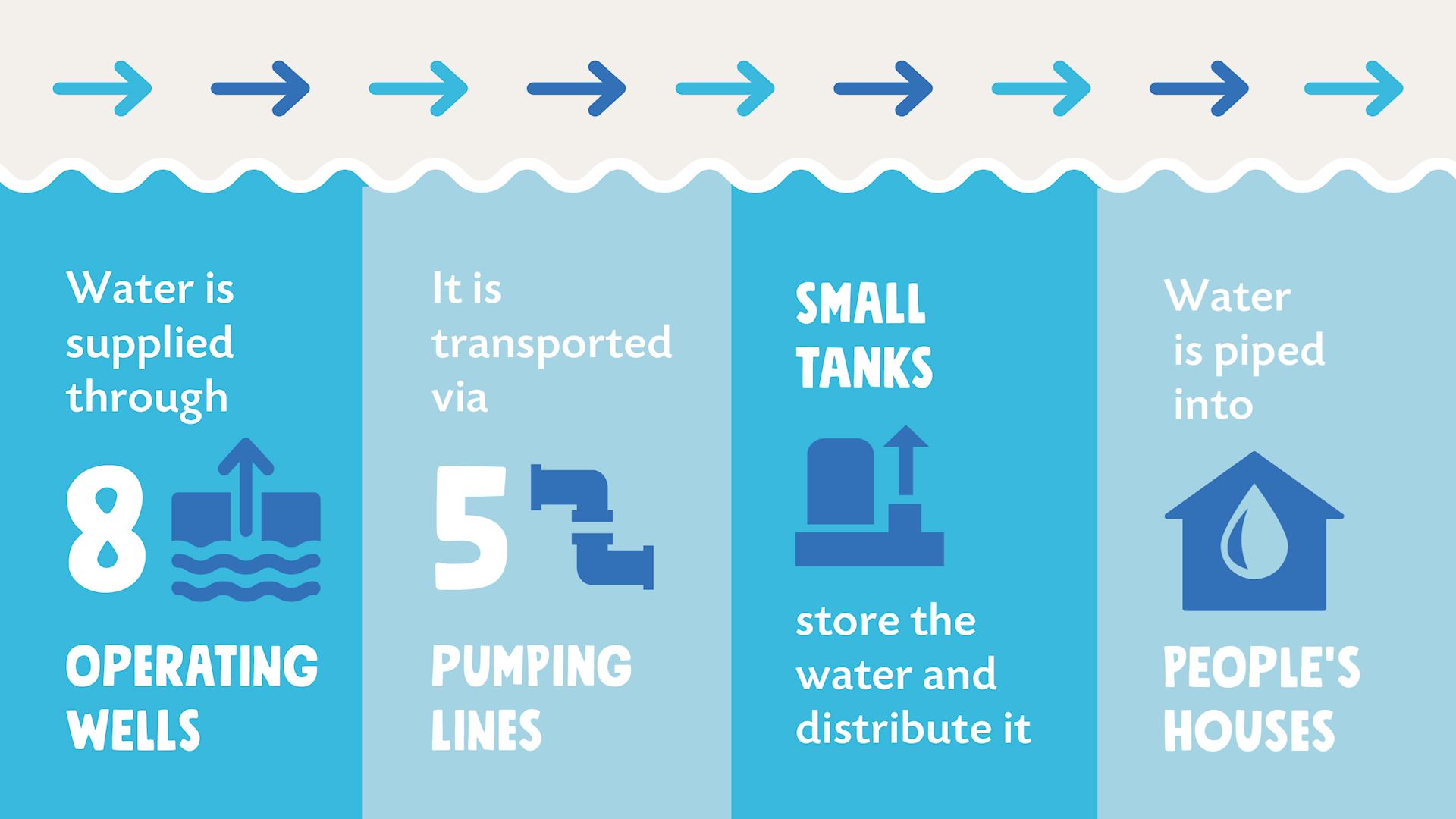
As you can see, unlike in Aden, there is no stage where water is sanitised before being piped into people's homes. However, like Aden, Ma'rib is reliant on transporting water from the wells to pipe it into people's homes.
Currently, only around 196,600 people are connected to Ma'rib's water network - or 13% of the Governorate's population. The rest rely on private water sources, many of them purchasing their water from 'water tankers'.
It is important to remember that, back in 2015, there were only 300,000 people living in Ma'rib Governorate, the majority of whom were connected to the public water network; but now that the population has increased to 1.5 million, almost 90% of them don't have access to public water.
What are the problems with the existing infrastructure?
There are four main problems with the current water network:
- There is not enough water being produced by the wells.
- The pumping lines are outdated.
- There aren't enough distribution tanks to meet the population's needs.
- There is no quality control for public or private water.
We've explored each of these issues in depth below:
1. There is simply not enough water being produced by the wells
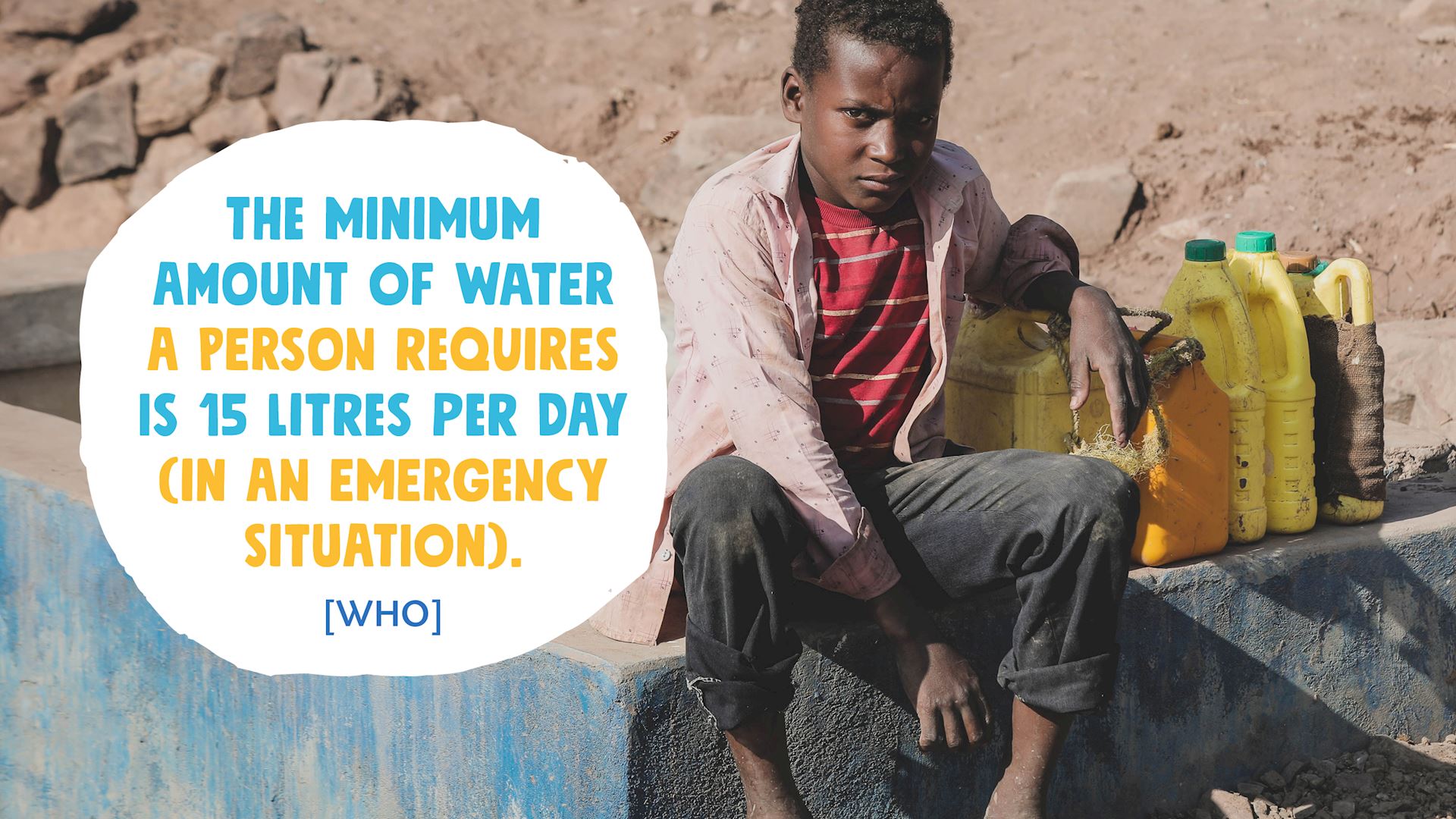
However, WHO add that 20 litres per day should be assured to take care of basic personal and food hygiene. Even 20 litres is still far below what is needed, as it does not cover laundry or bathing, which WHO assumes people can do at the water source if necessary.
In Ma'rib, the average person has access to between 10 and 17 litres per day, if they are connected to the water network. Our team have reported that some people are only getting public water once every two weeks, when they fill buckets, containers and bottles around the house in order to last them the next two weeks.

The main reason for the water shortage in Ma'rib is that the number of wells and the amount of water produced does not meet the actual need in the Governorate. There are eight operating wells, functioning 12-16 hours daily at their best.
Altogether, they produce 4,593,600 litres of water per day. This is enough for 306,240 people to have 15 litres of water per day, which is the minimum WHO requirement. Yet 1.5 million people live in Ma'rib - and there is absolutely no way the wells can meet all their needs.
In practice, most families are unconnected to the public water network, while the ones who are still ration water and supplement their supply with private sources.
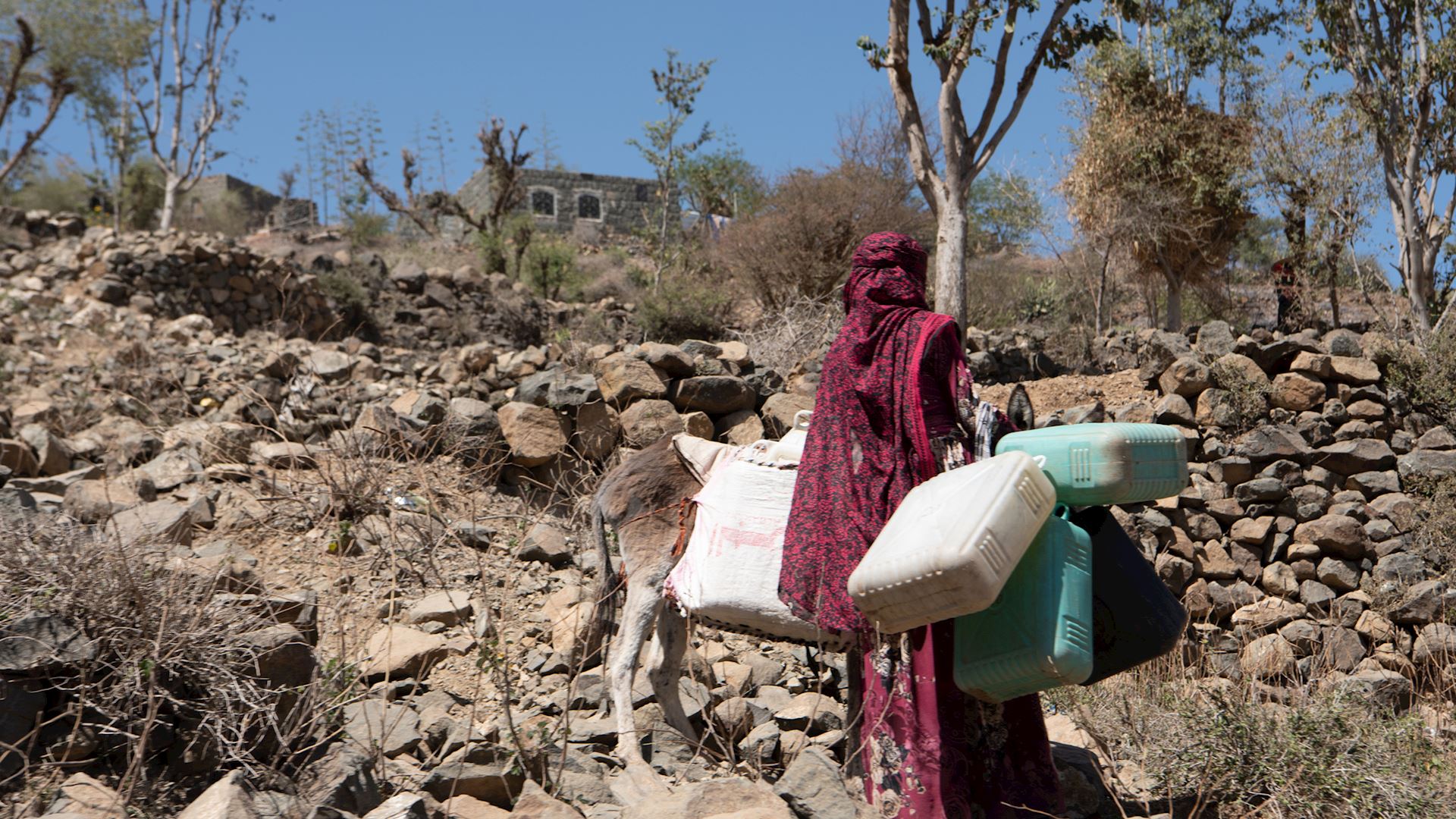
2. The water network includes outdated pumping lines
There are five main pumping lines which transport water from the wells. Only three of them are functioning.
The fourth line is responsible for transporting water from five wells, but it only has the capacity to handle two wells, and it is therefore 'subject to explosions from time to time' according to our team - an incredibly dangerous situation.
Meanwhile, the fifth line was able to take more pressure than the fourth when it was initially installed, as it is made from galvanised iron. However, after 25 years of use, its lifespan has expired - it is seriously rusted, and suffers two explosions a day on average when it is used. Moreover, due to the city's infrastructure changing, this line is now difficult and costly to repair, as it is now beneath widened asphalt streets.
To summarise: the fifth line definitely needs to be replaced, while the fourth line needs to either have the pressure taken off it or be replaced.
3. There aren't enough distribution tanks
The city's water network includes small tanks where water is stored and distributed to houses. If a pumping line is not working, the storage tank is supposed to ensure water service does not stop.
In practice, however, there are not enough tanks to meet the demand of water, which has increased significantly. So if a pumping line malfunctions or breaks, the water service stops directly - because there is no storage tank for the maintenance and emergency period. This is why some people have reported going without water for two weeks; everyone in Ma'rib has been forced to ration water as well as resort to purchasing extortionately priced private water.
It is worth listing the capacity and state of each tank, so take a look at the below table.
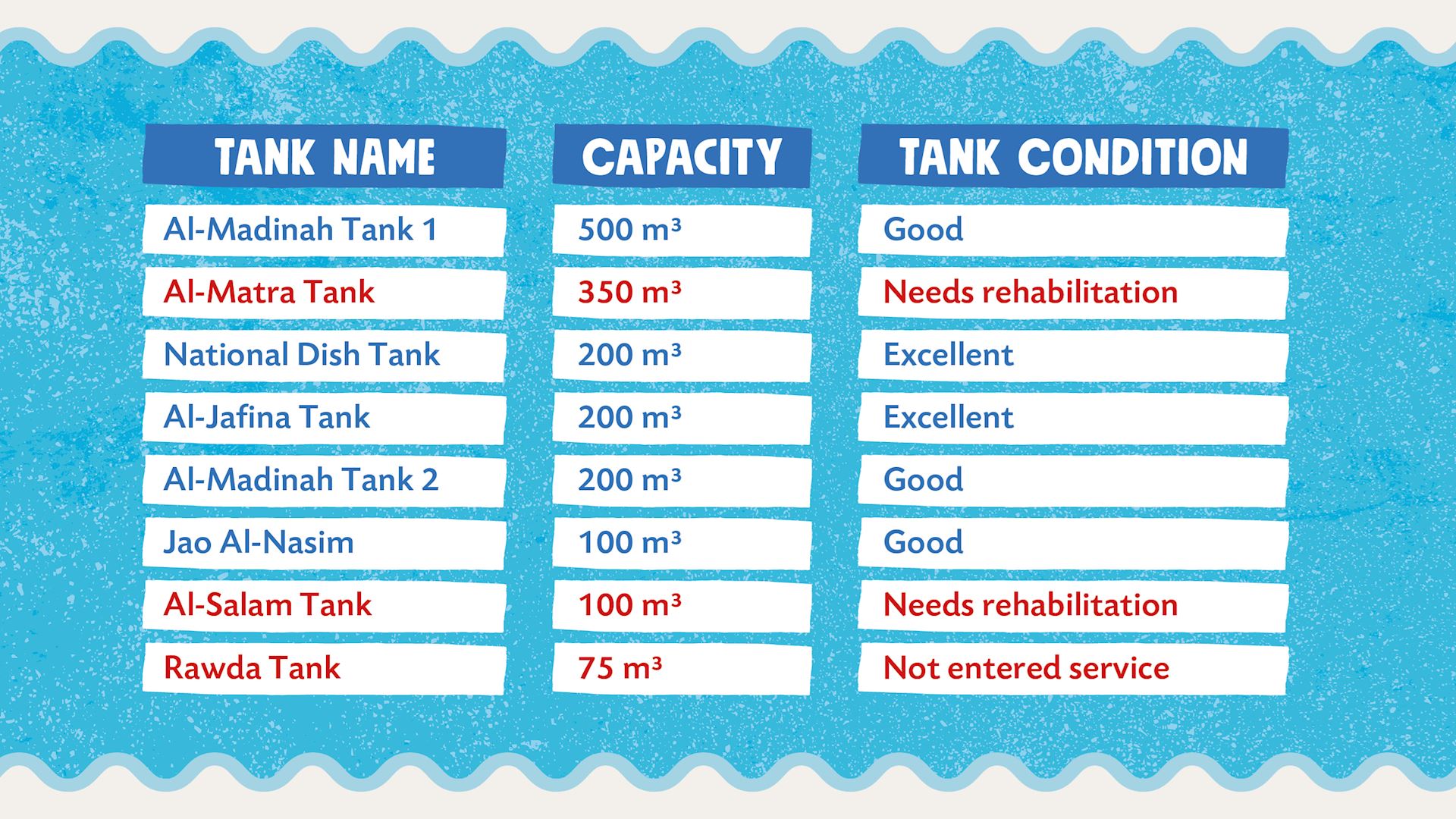
4. There is no water quality control
There is currently no control over the water quality of either public or private water supply. This is obviously unacceptable and has led to cholera outbreaks and other widespread water-related illnesses. A doctor at one of our medical clinics in Yemen told our team that the top problem their patients have is diarrhoea, because they have no choice but to drink unsafe water.

Water-related illnesses range from nausea to intestinal colic to liver disease - so they could have simple medical treatment or be potentially life-threatening. Children are the most vulnerable to these illnesses, especially those who are already suffering from malnutrition.
Humanitarian organisations are already working to tackle the lack of water quality control in Ma'rib. UNICEF launched a water quality programme a month ago, and we are cooperating with them to implement a project to monitor water sources inside and outside the city. A mobile laboratory has been made as an initial step to improving water quality in this Governorate.
What are our solutions to Ma'rib's water crisis?
To recap, Ma'rib has four main problems: not enough water produced by its wells, outdated pumping lines, lack of distribution tanks and no water quality control. With your support, we plan to address all these infrastructure problems.
Firstly, you can help us improve the production of the water sources. We will:
- Increase the production capacity of the two wells not yet in service and connect them to the city's network
- Rehabilitate the existing Jaw Al-Naseem well and bring it into service
- Drill new wells in the Al-Faw well field to reinforce existing water sources
- Provide fuel in order to increasing the operating hours for the wells to 22 hours per day
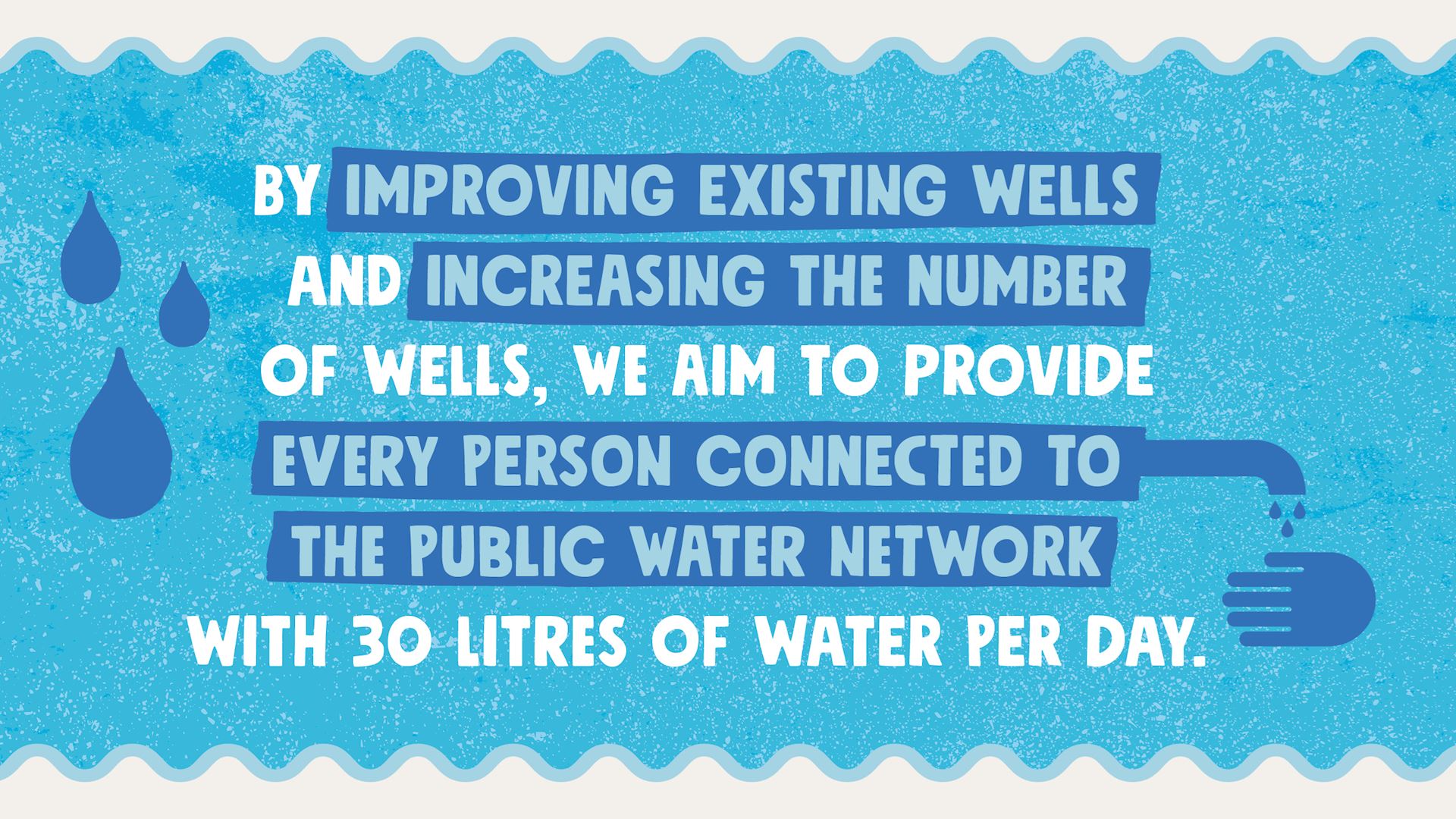
Secondly, we will increase the capacity of the pumping lines which transport water from the wells. Working with UNICEF, we will install a new pumping line to take the pressure off the existing lines, so they can all operate simultaneously for 22 hours per day.
Thirdly, we will increase the capacity of the water distribution tanks, by installing:
- A main tank for the centre of Ma’rib city with a capacity of at least 2,000 m³ - this reinforced concrete ground tank will become the main reservoir of Ma'rib
- A main tank for the Al-Rawda and Al-Sahn areas with a capacity of at least 1,500 m³
- A tank for the Al-Qasr and Al-Salam neighbourhoods with a capacity of at least 500 m³
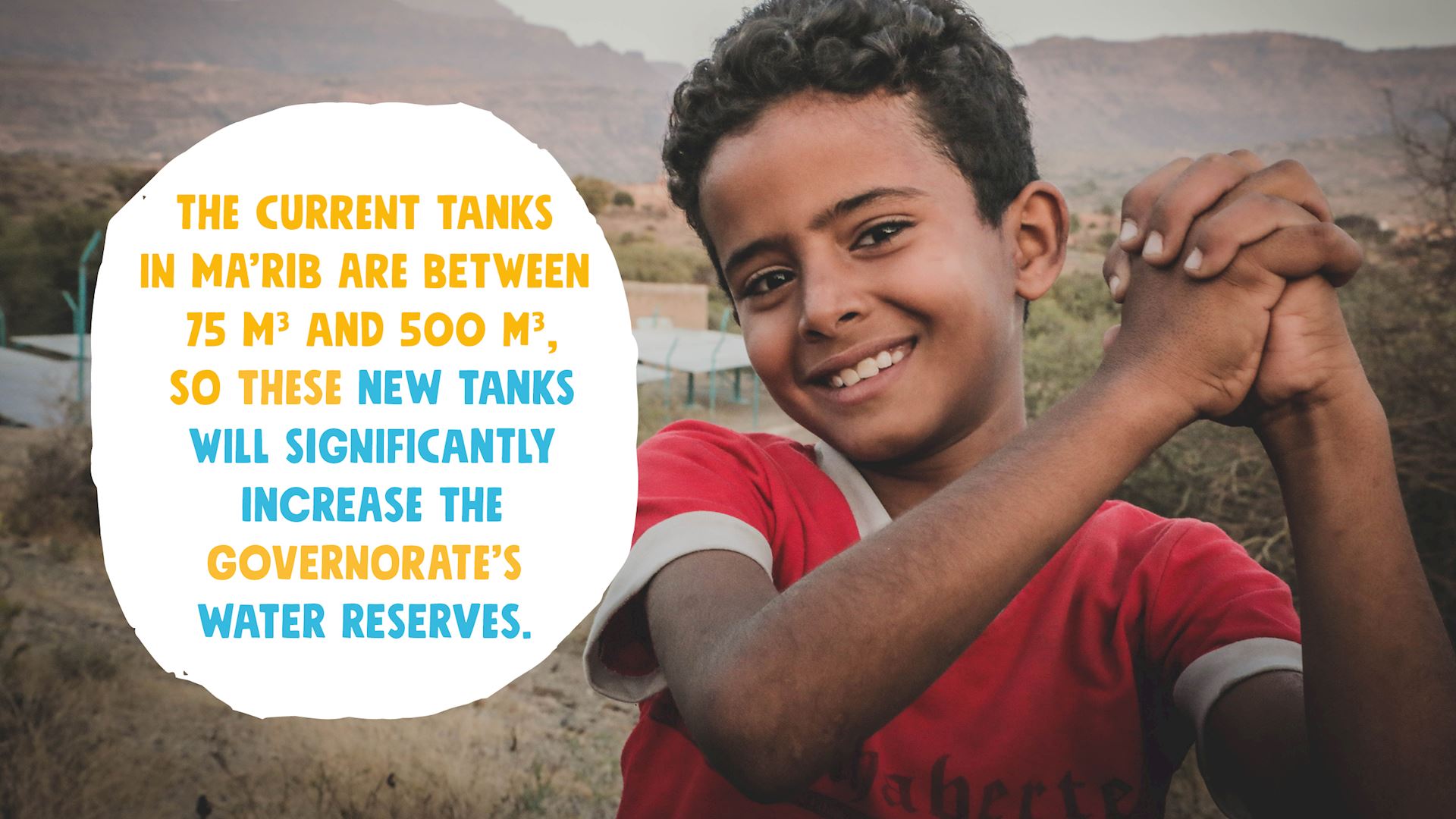
Fourthly, we will improve the water quality in Ma'rib in the following ways:
- It is necessary to install chlorine injection pumps on all wells to ensure the quality of water
- It is also essential to train at least one person to operate, calibrate, examine and document this process
- We will also continue to support UNICEF's national water quality programme
- We will implement a water safety plan in the districts of Al-Wadi and Al-Madinah, evaluate it and improve upon it, and then circulate it to the rest of the districts
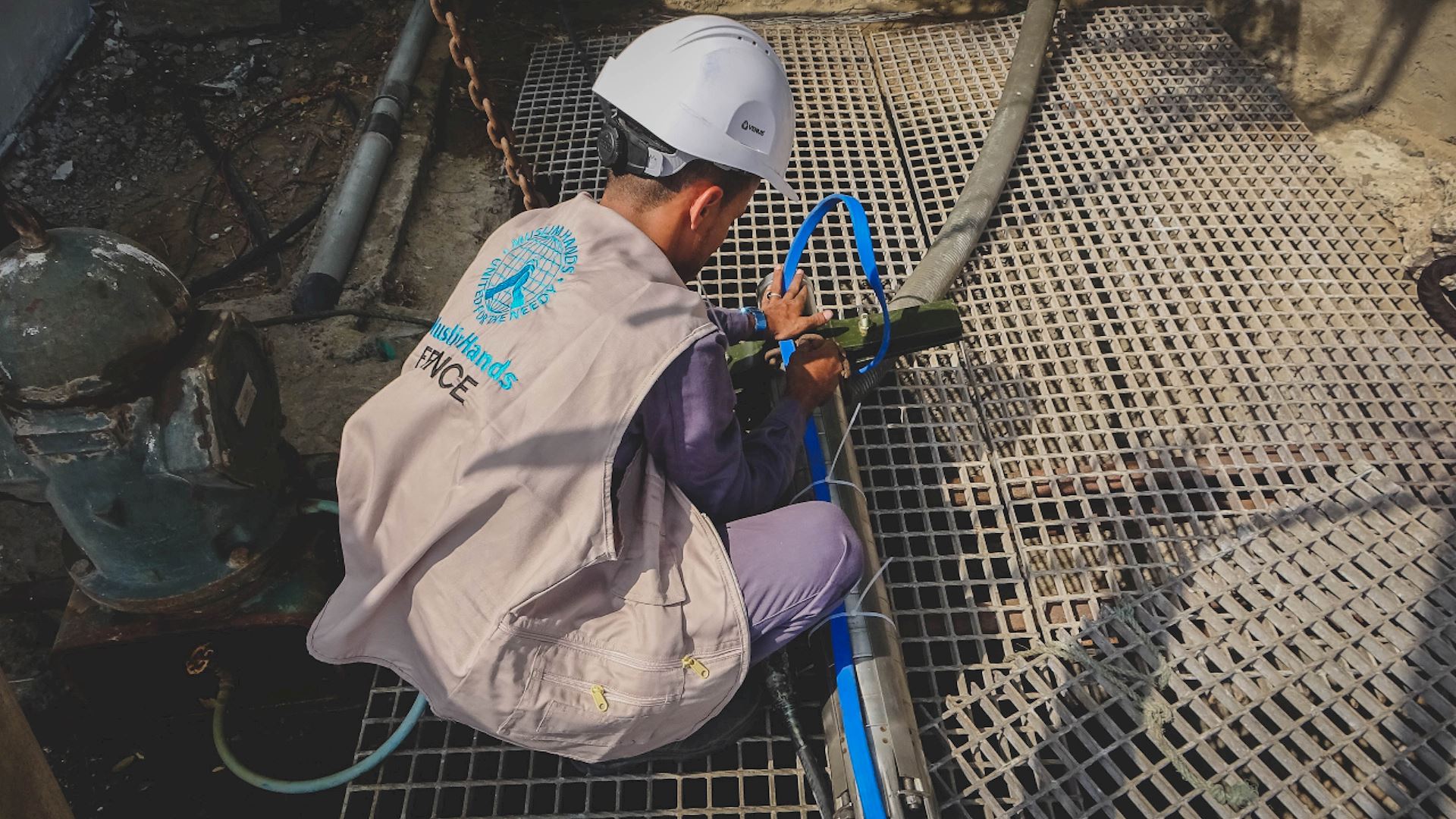
To summarise: this project gets to the heart of the water crisis in the Ma'rib Governorate by immediately increasing the amount of daily water available. The total cost of rehabilitating the water infrastructure is expected to be £468,000.
As mentioned before, 13% of the population is connected to the network. This project will increase this to 33% of the population. In sha Allah, after we've completed this project, we will fund research into further expanding Ma'rib's city network. With your support, we can then implement more expansions in the future, so more families in the Ma'rib Governorate have access to public water. All of this work is funded through the Yemen Water Fund.

Who will this project support and how?
As mentioned before, there are 1.5 million people in the Ma'rib Governorate, of which around 196,600 have access to the public water network. The rest are dependent on private water and the huge demand means that the price of water could keep rising if we don't intervene.
This project has two main objectives:
- To increase the amount of water these 196,600 people are receiving to 30 litres per day
- To give 307,000 more people access to the public water network
By the end of this project, you will be providing 30 litres of daily water to 33% of Ma'rib's population.
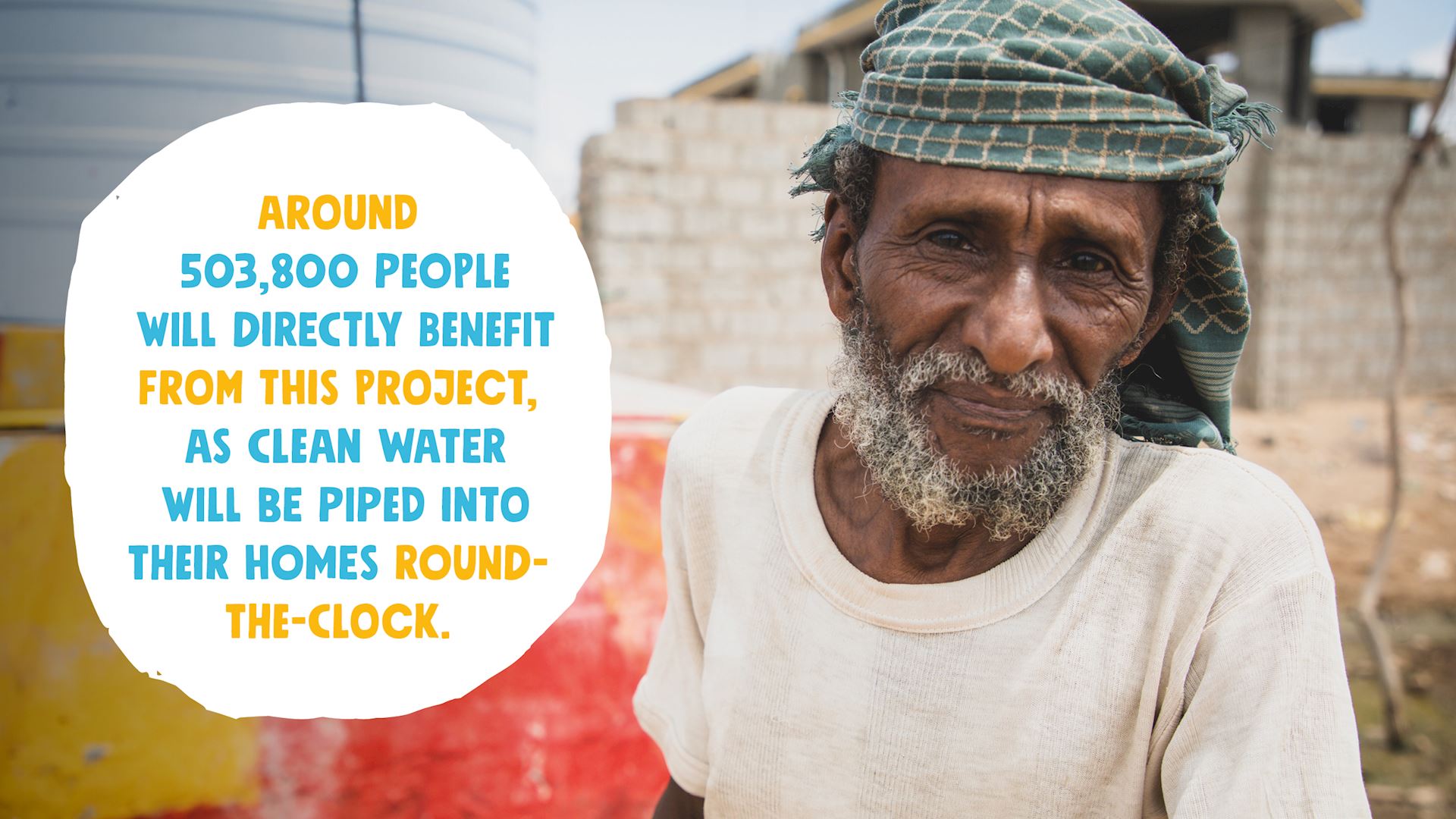
However, this project will impact 1.28 million people in TOTAL in Ma'rib. This is because the price of private water will drop due to a decrease in demand, thus making it more affordable for families and decreasing water shortages across the Governorate.
Moreover, we will also be supplying water to schools and hospitals, improving the city's facilities and increasing the overall quality of life.
It should also be noted that the water network will be serving 12 IDP camps from 27 water distribution points. These camps are currently hosting 10,100 families, who will be provided with round-the-clock water for free.

This project will significantly increase the amount of water available in the Ma'rib Governorate. Its impact will last for generations to come - you will be providing WATER FOR LIFE to 503,800 people, subhanAllah, as well as decreasing water shortages throughout the region.
You will be protecting children from cholera and diarrhoea as well as making sure no one has to ration water, which is a basic human right. You will be helping children to stay in school, rather than leaving so they can work and purchase water. You will be allowing communities to increase their personal and food hygiene to prevent the spread of epidemics. You will be reducing financial instability in Ma'rib and improving the overall quality of life - in sha Allah, you will completely transform the future of this Governorate!
Moreover, this incredible Sadaqah Jariyah will benefit the blessed people of Yemen, whom the Prophet (saw) expressed an extraordinary love for. Time and again, he praises their virtues and emphasises his closeness to them - and he even promises to quench their thirst on the Day of Judgement!
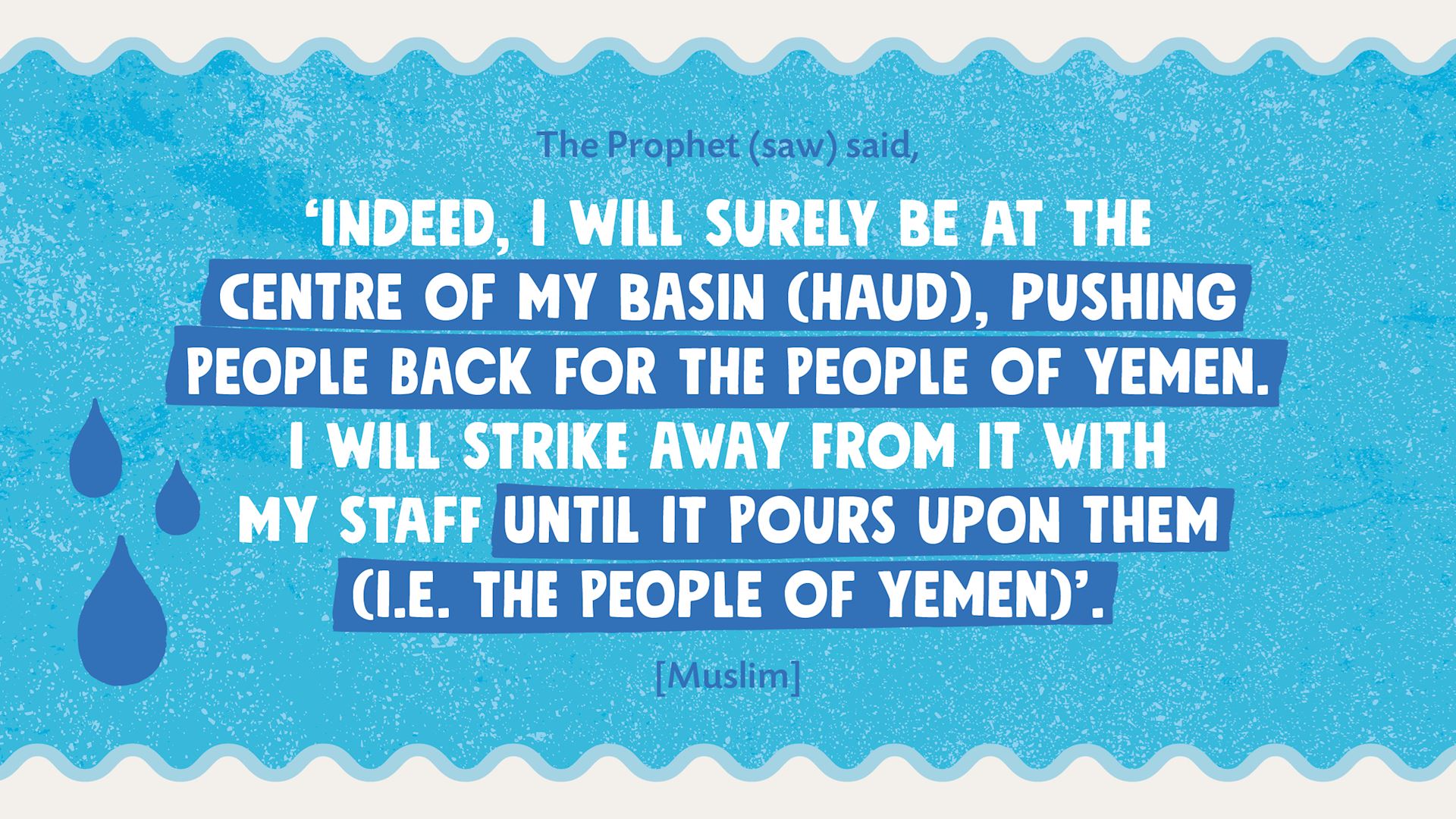
SubhanAllah, Allah (swt) has truly granted us an amazing opportunity to honour the people beloved to Him and His Messenger (saw). Every drop of water you give will quench the thirst of those who will be the first to drink from the Prophet's Basin on the Day of Judgement. You will be protecting them from illness, alleviating their poverty and ultimately saving lives.
We have the chance to send the people of Ma'rib water to drink every single day, round-the-clock, for years and years to come - so how can we turn down this chance?
We urge you to not only donate to the Yemen Water Fund, but also to set up a regular monthly payment of Zakat or Sadaqah so you can continually reap the rewards of this charity. We also urge you to share this cause with family and friends, so they can support the people who are so beloved to the Prophet (saw). Don’t miss supporting this noble cause!





